- Home
- Paulo Coelho
The Devil and Miss Prym: A Novel of Temptation Page 5
The Devil and Miss Prym: A Novel of Temptation Read online
Page 5
"I have to go," Chantal said. "There are a few things I need to do before I go to work."
Berta said goodbye and watched her all the way until she disappeared down the alley beside the church. The years she had spent sitting outside her door, looking up at the mountains and the clouds and holding conversations in her mind with her dead husband, had taught her to "see" people. Her vocabulary was limited, so she could find no other word to describe all the many sensations that other people aroused in her, but that was what happened: she "saw through" other people, and could tell what their feelings were.
It had all started at the funeral for her one great love. She was weeping, and a child next to her--the son of an inhabitant of Viscos, who was now a grown man and lived thousands of miles away--asked her why she was sad.
Berta did not want to frighten the child by mentioning death and final farewells, so all she said was that her husband had gone away and might not come back to Viscos for a long time.
"I think he was putting you on," the boy replied. "I've just seen him hiding behind a grave, all smiles, and with a soup spoon in his hand."
The boy's mother heard what he said and scolded him for it. "Children are always seeing things," she said, apologizing to Berta. But Berta immediately stopped crying and looked in the direction the child had indicated; her husband had always had the annoying habit of wanting to eat his soup with a special spoon, however much this irritated her--because all spoons are the same and hold the same amount of soup--yet he had always insisted on using his special spoon. Berta had never told anyone this, for fear people would think him crazy.
So the boy really had seen her husband; the spoon was the proof. Children could "see" things. From then on, Berta decided that she was going to learn to "see" as well, because she wanted to talk to her husband, to have him back--if only as a ghost.
At first, she shut herself up at home, rarely going out, waiting for him to appear to her. Then one day, something told her that she should go to the door of her house and start paying attention to other people, that her husband wanted her to have more joy in her life, for her to participate more in what was going on in the village.
She set up her chair outside her house and sat staring at the mountains; there were not many people out and about in the streets of Viscos, but on the very first day of her vigil, a neighbor returned from the next village, saying that they were selling quality cutlery very cheaply at the market there and, as proof, she produced a spoon from her bag.
Berta realized she would never see her husband again, but he was asking her to stay there, watching the village, and that was what she would do. As time went by, she began to perceive a presence beside her, to her left, and she was certain that he was there with her, keeping her company and protecting her from any danger, as well as teaching her to see things that others could not, such as the patterns made by the clouds, which always spelled out messages. She was rather sad that whenever she tried to look at him full on, the presence disappeared, but then she realized that she could talk to him using her intuition, and so they began having long conversations about all kinds of things.
Three years later, she was able to "see" people's feelings, as well as receive some very useful practical advice from her husband. That was why she refused to be fobbed off with less compensation than she deserved, and why she withdrew her money from the bank just before it crashed, taking with it many local people's hard-earned savings.
One morning--and she could no longer remember exactly when this had happened--her husband told her that Viscos might be destroyed. Berta immediately thought of earthquakes creating whole new ranges of mountains, but he reassured her that nothing of that sort would happen there, at least not for the next few thousand years. He was worried about another sort of destruction, even though he himself was not exactly clear what form it would take. All the same, he asked her to be on her guard, because this was his village, the place he loved most in the whole world, even if he had left it rather sooner than he would have wished.
Berta began to pay more attention to people, to the patterns made by the clouds, to the hunters who came and went, but nothing appeared to indicate that anyone was trying to destroy a village that had never harmed anyone. Yet still her husband insisted that she keep watch, and she had done as he asked.
Then three days ago, she had seen the stranger arrive with a devil by his side and she knew her wait was over. Today, she had noticed that Chantal was accompanied by both a devil and an angel. She immediately linked the two events and understood that something odd was happening in her village. She smiled to herself, glanced to her left and blew a discreet kiss. She was not a useless old woman; she had something important to do: to save the place where she had been born, even though she had no idea as yet what steps she should take.
Chantal left the old woman immersed in her thoughts, and went back to her room. It was whispered among the inhabitants of Viscos that Berta was a witch. It was said she had shut herself up in her house for almost a year and, during that time, had taught herself the magic arts. When Chantal had asked who could have taught them to Berta, some said it was the devil himself who appeared to her at night, while others swore that she invoked the spirit of a Celtic priest, using words her parents had taught her. But no one was overly concerned: Berta was harmless and she always had good stories to tell.
They were right, although they were always the same stories. Suddenly Chantal paused with her hand on the doorknob. Even though she had heard the story of how Berta's husband had died many times over, it was only now that she realized there was an important lesson in it for her too. She remembered her recent walk in the forest and the pent-up hatred she had felt inside her, a hatred that seemed to fly out all around her, threatening whoever was near, be it herself, the village, the people in it or their children.
But she had only one real target: the stranger. Concentrate, shoot and kill your prey. To do that, she needed a plan--it would be foolish to speak out that night and let the situation run out of control. She decided to put off for another day telling the story of how she had met the stranger, if, that is, she ever did tell the other inhabitants of Viscos.
That night, when she went to collect the money for the round of drinks that the stranger usually bought, Chantal noticed that he had slipped her a note. She put it straight into her pocket, pretending that it was a matter of no importance, even though she was aware of the stranger's eyes occasionally seeking hers, as if silently questioning her. The roles seemed to have been reversed: it was she who was in control of the situation, she who could choose the battlefield and the hour of the fight. That was how all the most successful hunters behaved: they always arranged things so that the prey would come to them.
It was only when she returned to her room, this time confident that she would sleep soundly, that she looked at the note: the stranger was asking her to meet him in the place where they had first met.
He closed by saying that he would prefer to talk to her alone, but added that, if she wanted, they could also speak with everyone else present too.
The threat did not escape her, but she was, in fact, delighted that he had made it. It was proof that he was losing control, because truly dangerous men and women never make threats. Ahab, the man who brought peace to Viscos, always used to say: "There are two kinds of idiots--those who don't take action because they have received a threat, and those who think they are taking action because they have issued a threat."
She tore the note into shreds and flushed it down the toilet; then she took a scalding hot bath, slipped into bed; and smiled. She had got exactly what she wanted: to meet the stranger again for a conversation alone. If she wanted to find out how to defeat him, she needed to get to know him better.
She fell asleep almost at once--a deep, refreshing, easeful sleep. She had spent one night with Good, one with Good and Evil, and one with Evil. Not one of the three had produced any definite result, but they were all still alive in her soul, and now t
hey were beginning to fight amongst themselves to see who was strongest.
By the time the stranger arrived, Chantal was drenched--the storm had recommenced.
"Let's not talk about the weather," she said. "As you can see, it's raining. I know a place where it'll be easier for us to talk."
She got to her feet and picked up a long canvas bag.
"You've got a shotgun in there," the stranger said.
"Yes."
"And you want to kill me."
"Yes, I do. I don't know if I'll succeed, but that's what I'd like to do. I brought the weapon here for another reason, though: I might meet the rogue wolf on the way, and if I could shoot him, I might win some respect in Viscos. No one believes me, but I heard him howling last night."
"And what is this rogue wolf?"
At first she doubted whether to share anything more with this man who was her enemy. But then she remembered a book on Japanese martial arts--she always read any books left behind by hotel guests, no matter what the books were about, because she didn't want to spend her own money buying them. There it was written that the best way to weaken one's enemy was to get him to believe that you were on his side.
As they trudged through the wind and the rain, she told him the story. Two years ago, a man from Viscos--the blacksmith, to be precise--was out for a walk when, all of a sudden, he came face-to-face with a wolf and its young. The man was terrified, but he tore off a branch and made to attack the animal. Normally, the wolf would have run away, but as it was with its young, it counterattacked and bit the man on the leg. The blacksmith, a man whose job requires enormous strength, managed to deal the wolf such a blow that it finally ran back into the forest with its cubs and was never seen again; all anyone knew was that it had a white mark on its left ear.
"But why is it called the rogue wolf?"
"Usually even the fiercest of animals will only attack in exceptional circumstances, in order, for example, to protect its young. However, if an animal does attack and tastes human blood, then it becomes dangerous; it will always want more; it will cease being a wild animal and become a killer. Everyone believes that one day the wolf will attack again."
"That's my story too," the stranger thought.
Chantal was walking as fast as she could because she was younger and fitter than he and wanted to gain a psychological advantage over her companion by tiring him out and humiliating him, and yet he managed to keep up with her. He was out of breath, but he never once asked her to slow down.
They reached a small, well-camouflaged, green plastic tent, used by hunters as a hide. They sat inside, rubbing their frozen hands and blowing on them.
"What do you want?" she asked him. "Why did you give me that note?"
"I'm going to ask you a riddle: of all the days in our life, which is the one that never comes?"
There was no reply.
"Tomorrow," the stranger said. "But you seem to believe that tomorrow will come and keep putting off what I asked you to do. We're getting towards the end of the week, and if you don't say something, I'll have to do it myself."
Chantal left the refuge, stood a safe distance from it, undid the canvas bag, and took out the shotgun. The stranger didn't seem to attach any importance to this.
"You dug up the gold again," he went on. "If you had to write a book about your experiences, how do you think most of your readers would react--given all the difficulties they have to face, the injustices dealt to them by life and other people, the struggle they have in order to pay for their children's schooling and to put food on the table--don't you think that those people would be urging you to take the gold and run?"
"I don't know," she said, loading a cartridge into the gun.
"Nor do I. But that's the answer I'm looking for."
She inserted the second cartridge.
"You're willing to kill me, despite that reassuring little tale about finding a wolf. But that's all right, because that too provides me with an answer to my question: human beings are essentially evil; even a young woman from a remote village is capable of committing murder for money. I'm going to die, but now I have my answer, so I can die happy."
"Here, take it," she said, handing him the gun. "No one knows that I know you. All the details you gave in the hotel are false. You can leave when you want and, as I understand it, you can go anywhere you want to in the world. You don't need to have a good aim: all you have to do is point the shotgun in my direction and squeeze the trigger. Each cartridge is full of tiny bits of lead; as soon as they leave the barrel, they spread out into a cone shape. They can kill birds or human beings. You can even look the other way if you don't want to see my body being blown apart."
The man curled his finger around the trigger, and Chantal was surprised to see that he was holding the gun correctly, like a professional. They stood like that for a long while, and she was aware that he had only to slip or be startled by an animal coming on them unexpectedly and his finger could move and the gun go off. She suddenly realized how childish her gesture had been, trying to defy someone merely for the pleasure of provoking him, saying that he was incapable of doing what he was asking others to do.
The stranger was still pointing the gun at her, staring at her unblinking, his hands steady. It was too late now--maybe deep down he thought it wouldn't be such a bad idea to end the life of this young woman who had dared to challenge him. Chantal was on the point of asking him to forgive her, but the stranger lowered the gun before she could say a word.
"I can almost touch your fear," he said, handing her back the gun. "I can smell the sweat pouring off you, despite the rain, and even though the wind is shaking the treetops and making an infernal racket, I can hear your heart thumping in your throat."
"I'm going to do what you asked me to do this evening," she said, pretending she hadn't heard the truths he was telling her. "After all, you came to Viscos to learn about your own nature, to find out if you were good or evil. There's one thing I've just shown you: regardless of what I may have felt or stopped feeling just now, you could have pulled the trigger, but you didn't. Do you know why? Because you're a coward. You use others to resolve your own conflicts, but you are incapable of taking certain decisions."
"A German philosopher once said: 'Even God has a hell: his love of mankind.' No, I'm not a coward. I've pressed many worse triggers than this one, or, rather, I have made far better guns than this and distributed them around the world. I did it all perfectly legally, got the transactions approved by the government, the export licenses, paid all the necessary taxes. I married a woman who loved me, I had two beautiful daughters, I never stole a penny from my company, and always succeeded in recovering any money owed to me.
"Unlike you, who feel persecuted by destiny, I was always a man of action, someone who struggled with the many difficulties in my way, who lost some battles and won others, but always understood that victories and defeats form part of everyone's life--everyone, that is, except cowards, as you call them, because they never lose or win.
"I read a lot. I was a regular churchgoer. I feared God and respected His commandments. I was a highly paid director of a huge firm. Since I was paid commission on every deal we made, I earned more than enough to support my wife, my daughters, and even my grandchildren and my greatgrandchildren; because the arms trade is the most profitable business in the world. I knew the value of every item I sold, so I personally checked all our transactions; that way I uncovered several cases of corruption and dismissed those involved and halted the sales. My weapons were made to help defend order, which is the only way to ensure progress and development in this world, or so I thought."
The stranger came up to Chantal and took her by the shoulders; he wanted her to look him in the eyes and know that he was telling the truth.
"You may consider arms manufacturers to be the lowest of the low. Perhaps you're right, but the fact is that man has used weapons ever since he lived in caves--first to kill animals, then to win power over others. The world
has existed without agriculture, without domesticated animals, without religion, without music, but never without weapons."
He picked up a stone from the ground.
"Here's the first of them, generously donated by Mother Nature to those who had to confront prehistoric animals. A stone like this doubtless saved the life of a man, and that man, after countless generations, led to you and me being born. If he hadn't had that stone, the murderous carnivore would have devoured him, and hundreds of millions of people would not have been born."
The wind was blowing harder, and the rain was battering them, but neither of them looked away.
"Many people criticize hunters, but Viscos welcomes them with open arms because it lives off them; some people hate seeing a bull in a bullring, but go and buy the meat from the butcher's claiming that the animal had an 'honorable' death; a lot of people are critical of arms manufacturers, but they will continue to exist until there's not a single weapon left on the face of the earth. Because as long as one weapon remains, there will always have to be another, to preserve the fragile balance."
"What has all this got to do with my village?" Chantal demanded. "What has it got to do with breaking the commandments, with murder, stealing, with the essence of human nature, with Good and Evil?"
At this, the stranger's eyes changed, as if overwhelmed by a deep sadness.
"Remember what I told you at the beginning. I always tried to do my business according to the law; I considered myself what people usually term a 'good man.' Then one evening I received a phone call in my office: it was a woman's voice, soft but devoid of emotion. She said her terrorist group had kidnapped my wife and daughters. They wanted a large quantity of what they knew I could give them--weapons. They told me to keep quiet about it, they told me that nothing would happen to my family if I followed their instructions.
"The woman rang off saying that she would call again in half an hour and told me to wait for her call in a phone booth at the train station. She said not to worry; my family was being well treated and would be freed within a few hours, because all I had to do was send an electronic message to one of our subsidiaries in a certain country. It wasn't even real theft, more like an illegal sale that would go completely unnoticed in the company I worked for.

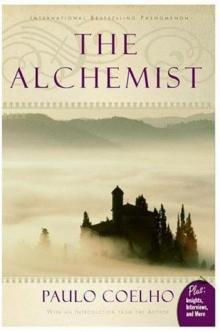 The Alchemist
The Alchemist Maktub
Maktub Like the Flowing River
Like the Flowing River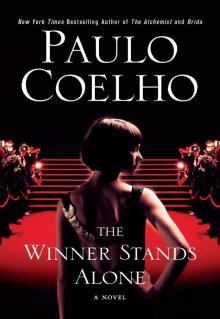 The Winner Stands Alone
The Winner Stands Alone The Spy
The Spy By the River Piedra I Sat Down and Wept: A Novel of Forgiveness
By the River Piedra I Sat Down and Wept: A Novel of Forgiveness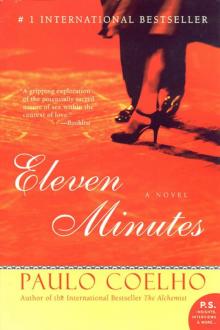 Eleven Minutes
Eleven Minutes Manuscript Found in Accra
Manuscript Found in Accra Warrior of the Light
Warrior of the Light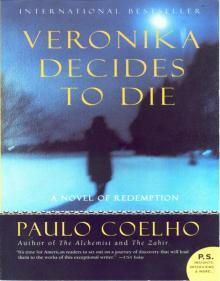 Veronika Decides to Die: A Novel of Redemption
Veronika Decides to Die: A Novel of Redemption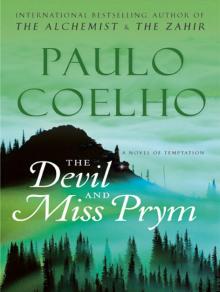 The Devil and Miss Prym: A Novel of Temptation
The Devil and Miss Prym: A Novel of Temptation The Valkyries: An Encounter With Angels
The Valkyries: An Encounter With Angels Brida: A Novel
Brida: A Novel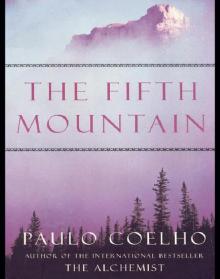 Fifth Mountain: A Novel
Fifth Mountain: A Novel Adultery
Adultery Inspirations
Inspirations The Archer
The Archer The Witch of Portobello
The Witch of Portobello The Pilgrimage
The Pilgrimage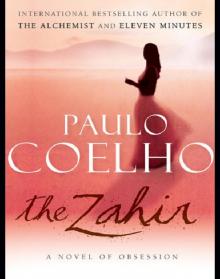 The Zahir
The Zahir Brida
Brida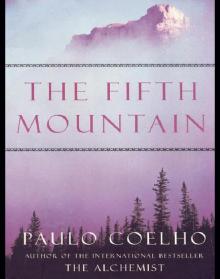 The Fifth Mountain
The Fifth Mountain Like the Flowing River: Thoughts and Reflections
Like the Flowing River: Thoughts and Reflections Manual of the Warrior of Light
Manual of the Warrior of Light By The River Piedra I Sat Down & Wept
By The River Piedra I Sat Down & Wept The Supreme Gift
The Supreme Gift Aleph
Aleph Hippie
Hippie Witch of Portobello
Witch of Portobello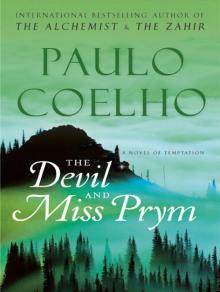 The Devil and Miss Prym
The Devil and Miss Prym The Alchemist - 10th Anniversary Edition
The Alchemist - 10th Anniversary Edition The Valkyries
The Valkyries